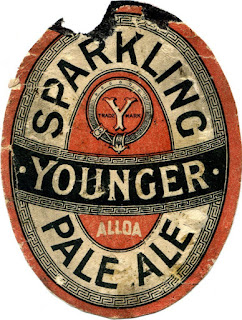They had a couple of cask beers in my youth. They were sold under varying names. 80/- was usually called IPA in England. Its weaker sibling XXPS, went by the name of 70/- North of the border and Scotch in the land of the Sassenachs. When I was supping it in one of the few free houses in the Newark area where I grew up, I was clueless as to its history. Complicated, messy and too much to go into here. I'll just say that its early years, without the S suffix, were as a full-strength IPA.
Being 1943, the flaked oats are no surprise. In fact, you’d expect more. When this was brewed in October, 15% was the norm. Not sure why there is so little.
The hops are dead fun: Kent and experimental. Both from the 1942 harvest. Pretty recent, then. Just bigger all of them.
| 1943 William Younger XXPS | ||
| pale malt | 7.25 lb | 80.56% |
| flaked barley | 1.25 lb | 13.89% |
| flaked oats | 0.50 lb | 5.56% |
| Fuggles 75 min | 0.50 oz | |
| Fuggles 30 min | 0.50 oz | |
| OG | 1038 | |
| FG | 1012 | |
| ABV | 3.44 | |
| Apparent attenuation | 68.42% | |
| IBU | 12 | |
| SRM | 3.5 | |
| Mash at | 153º F | |
| Sparge at | 160º F | |
| Boil time | 75 minutes | |
| pitching temp | 61º F | |
| Yeast | WLP028 Edinburgh Ale | |











































































3 comments:
Any sense what the experimental hops were? I don't see any obvious candidates in this article, but I realize the experiment could be something mundane like improving mildew resistence rather than creating a new flavor.
http://zythophile.co.uk/2008/01/24/mr-goldings-descendants/
Northern Brewer, perhaps?
Bred in 1934, released in 1944.
According to Peter Darby (Wye Hops):
"Northern Brewer was developed by Prof Salmon at Wye College in 1944 and was championed by Scottish and Newcastle, particularly through their Fountains Brewery in Edinburgh (hence the name)."
https://www.ratebeer.com/forums/hop-notes_86709.htm
Younger's were merged with McEwans Fountain brewery.
Brewed up this one, hit an OG of 1.040 and finished at 1.012 for a respectable 3.7% . This really, really tastes like many of the American pre-prohibition era Cream Ales I have brewed in the past. Couple of my Brit friends here in Germany loved it. May make this a regular rotation beer on the Keezer, especially in the summer. in the US we would call this "Lawnmower Beer"
Post a Comment